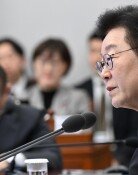Election missteps risk reviving fears of fraud
Election missteps risk reviving fears of fraud
Posted May. 31, 2025 06:58,
Updated May. 31, 2025 06:58
Early voting for the June 3 presidential election ended on May 30 amid a series of missteps by the National Election Commission (NEC), raising fresh concerns about election integrity. While voter turnout on the first day of early voting reached a record high, participation slowed on the afternoon of the second day, resulting in a final rate slightly below that of the 2022 presidential election.
On May 30, ballots from the 2024 general elections—already marked for specific candidates—were discovered in Gimpo and Bucheon, Gyeonggi Province. If these ballots were not counted in last year’s vote, the oversight would mark a serious failure in election management. A day earlier, in Seoul’s Shinchon area, some voters left polling stations with their ballots to avoid crowds, exposing another breakdown in control. NEC Secretary General Park Chan-jin apologized for what he called a “clear mistake,” but the commission’s failure to prepare for the predictable surge in turnout was evident.
Further irregularities came to light. In Seoul’s Daechi-dong, a poll worker was caught casting two votes—one under her name and another using her husband’s ID. In Yongin’s Suji District, a voter reported finding a pre-marked ballot inside an absentee voting envelope. The NEC claimed the case appeared fabricated to sow distrust, but even if the ballot was inserted by a third party, it signals a dangerous vulnerability in the system.
In other cases, individuals attempted to enter NEC offices in Guro District, Seoul, and Hadong, South Gyeongsang Province, under the pretense of monitoring ballot boxes.
Meanwhile, false information is spreading rapidly on social media. A fabricated statement criticizing early voting management was circulated under the name of ruling party candidate Kim Moon-soo. In another controversy, a naturalized voter originally from China posted an image of a marked ballot to Chinese social media, fueling speculation of foreign interference.
This election demands impeccable oversight. One of the cited reasons for the martial law declaration that ultimately led to the president’s impeachment was suspected election fraud. To prevent similar claims from taking root, the NEC must ensure every vote is cast and counted with care.
While isolated misconduct by individual voters may be unavoidable, the systemic failures of the past two days must not be repeated. That is the NEC’s institutional responsibility. In a fragile political environment marked by martial law and impeachment, the nation is struggling to rebuild its democracy. The NEC must account for every foreseeable risk and prevent further chaos on June 3. Only by doing so can voter confidence be preserved. If mismanagement continues, it could reignite the very conspiracy theories that had begun to fade.




![[동아광장/박용]이혜훈 가족의 엇나간 ‘대한민국 사용설명서’](https://dimg.donga.com/c/138/175/90/1/wps/NEWS/IMAGE/2026/01/29/133262432.1.jpg)


